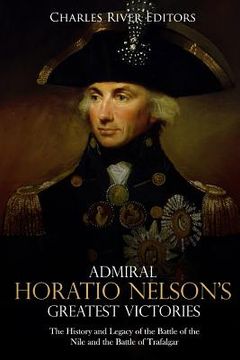Admiral Horatio Nelson's Greatest Victories: The History and Legacy of the Battle of the Nile and the Battle of Trafalgar (en Inglés)
Reseña del libro "Admiral Horatio Nelson's Greatest Victories: The History and Legacy of the Battle of the Nile and the Battle of Trafalgar (en Inglés)"
*Includes pictures *Includes accounts of the battles *Includes online resources and a bibliography for further reading Over the course of its history, England has engaged in an uncountable number of battles, but none of her military heroes has had a greater military legacy than Admiral Lord Horatio Nelson, 1st Viscount Nelson, 1st Duke of Bronté. Whether traveling to Trafalgar Square or one of the hundreds of pubs named after him, seemingly it becomes easy to believe that no Briton has cast as long a shadow. Nelson is known across the world for his decisive victory at Trafalgar, made all the more legendary by the fact that he was mortally wounded at the height of his greatest feat. And it is understandable that any man who could thwart Napoleon's ambitions as well as Nelson did would earn a place in the history books. But Nelson embodied every virtue of his homeland as a dashing, courageous military officer who was impeccably cultured, and the best at what he did. Indeed, as the personification of the supremacy of the Royal Navy, the man and his life had a powerful resonance well before his death. Before Trafalgar, Nelson had already earned enduring fame for the British victory at the Battle of the Nile. In 1798, he was given command of a small squadron and sent ahead to Gibraltar, and eventually given instructions to hunt down and destroy Napoleon's fleet. Indeed, the coming battle was the battle of annihilation Nelson had sought - of 13 French battleships engaged, 2 were destroyed and 9 were captured. British losses were negligible, with no ships lost and about 900 killed or wounded. French casualties were at least 2,000, with thousands more captured. The French Mediterranean fleet had been wiped out, and Napoleon's expeditionary force was now stranded. With Nelson's decisive victory, the Royal Navy had once again asserted itself as the dominant power in the Mediterranean. At the same time, Nelson's inability to intercept Napoleon at sea allowed the French transports and ground forces to survive unscathed, and they eventually made their way back to France. The stage was now set for over a decade of massive campaigns and battles that would lead to an even more famous victory for Nelson. Over the course of its history, England has engaged in an uncountable number of battles, but a select few have been celebrated like the Battle of Trafalgar, one of the most important naval battles in history. Before the battle, Napoleon still harbored dreams of sailing an invasion force across the English Channel and subduing England, but that would be dashed on October 21, 1805 by a British fleet that was outnumbered and outgunned. That morning, Nelson's fleet, 27 strong, bore down on the Franco-Spanish fleet, approaching at right angles in two columns. French Admiral Pierre-Charles Villeneuve's disposition was conventional - a single line of battle, ill formed due to the very light winds and the poor seamanship of many of the crews. Traditional naval warfare strategies called for approaching an enemy fleet in one line and then creating a parallel line that allowed as many guns as possible to fire. At the same time, that kind of line of battle allowed for admirals to signal during battle, and it made retreating in an orderly fashion easier. After all, if an enemy's ships pursued during a retreat, they would break their own line. The problem with that strategy as Nelson saw it is that the ability to retreat meant fighting a decisive naval battle would be made much more difficult. Thus, at Trafalgar he employed a completely innovative strategy. The British plan was to punch straight through the enemy line with two approaching columns of ships, which would cut the Franco-Spanish fleet's line in three, prompting the melee that they knew would capitalize on their tactical superiority. The impact of Trafalgar literally set the stage for the rest of the Napoleonic Era.

